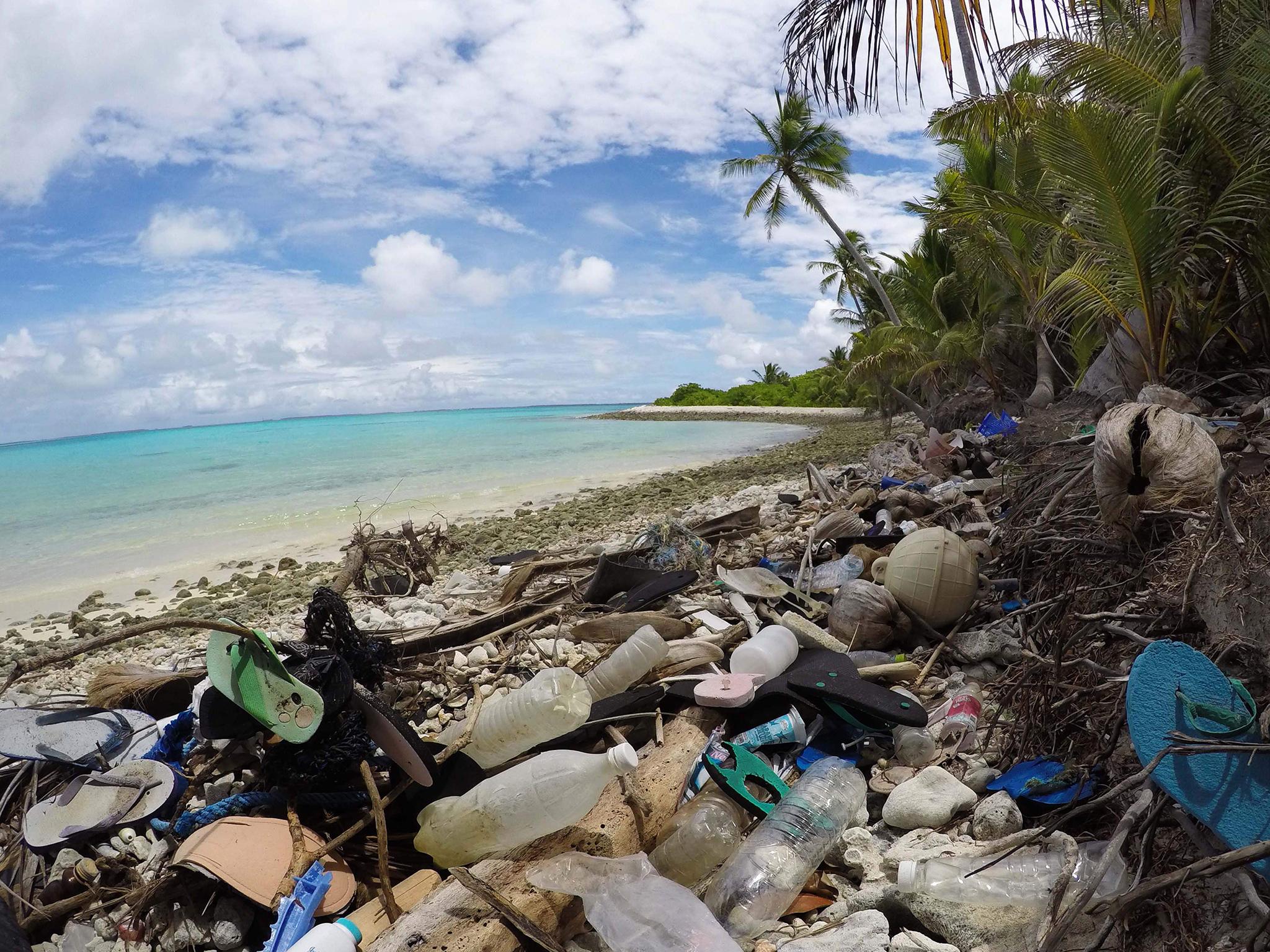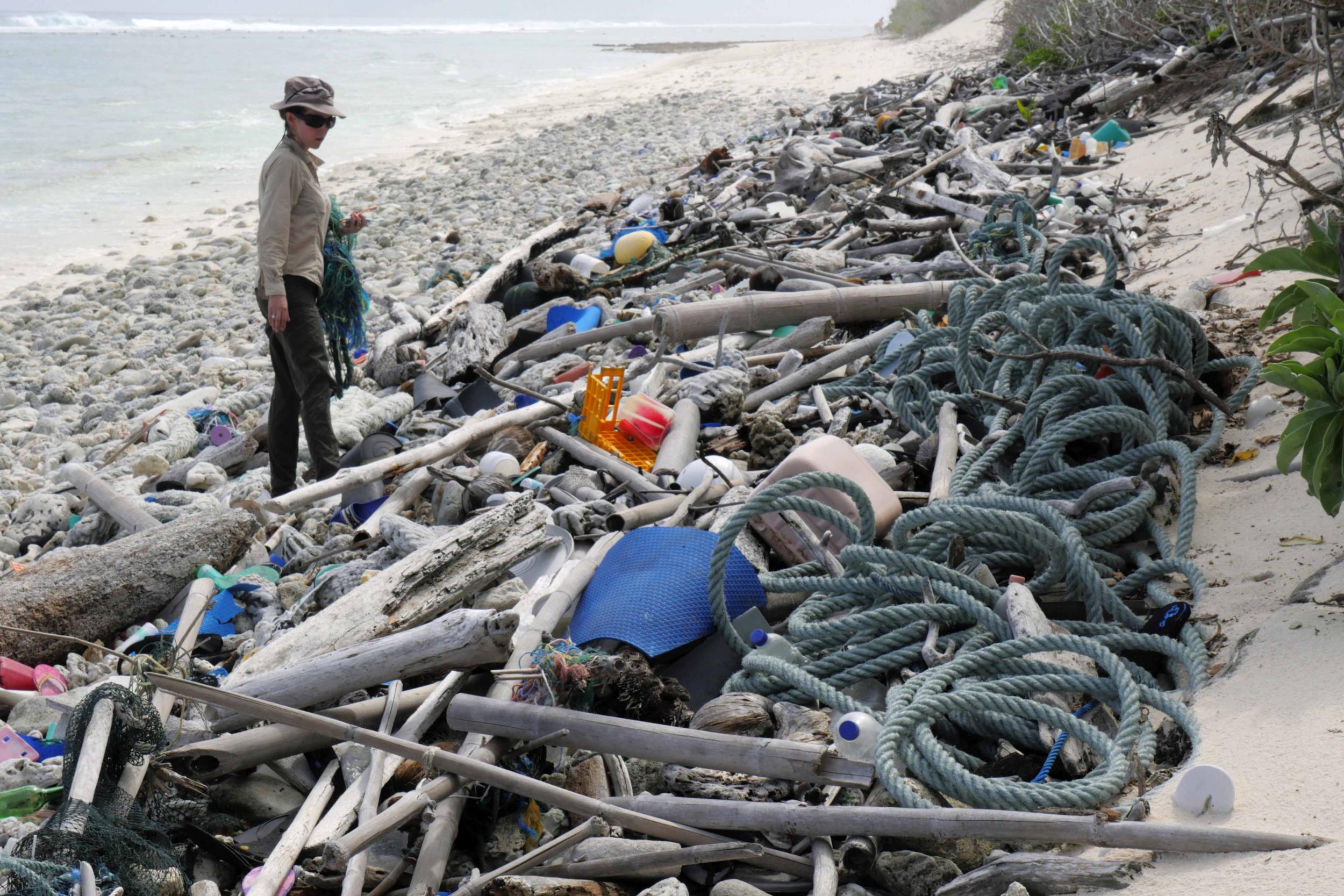‘Like canaries in a coal mine’: Idyllic Australian islands choked with 414 million pieces of plastic pollution
Over 230 tonnes of plastic, including almost a million shoes and 370,000 toothbrushes found on tropical beaches

A remote island paradise in the Indian Ocean, made up of 27 tiny islets fringed with palm trees and white sand beaches around sparkling lagoons, is rapidly beginning to resemble a rubbish dump due to the huge amount of plastic waste washing ashore, a report has said.
A survey of plastic pollution on the Cocos (Keeling) Islands – an Australian territory east of Indonesia – has revealed beaches littered with an estimated 414 million pieces of plastic debris.
The study led by Institute for Marine and Antarctic Studies (IMAS) researcher Dr Jennifer Lavers estimated the beaches on the islands are littered with a total of 238 tonnes of plastic, including almost a million shoes and 373,000 toothbrushes.
Dr Lavers said remote islands, which don’t have large human populations depositing rubbish nearby, are an indicator of the amount of plastic debris circulating in the world’s oceans.
“Islands such as these are like canaries in a coal mine and it’s increasingly urgent that we act on the warnings they are giving us,” Dr Lavers said.
“Plastic pollution is now ubiquitous in our oceans, and remote islands are an ideal place to get an objective view of the volume of plastic debris now circling the globe.
“Our estimate of 414 million pieces weighing 238 tonnes on Cocos (Keeling) is conservative, as we only sampled down to a depth of 10 centimetres and couldn’t access some beaches that are known debris ‘hotspots’.”
Dr Lavers’ has previously made headlines with her research when in May 2017 she revealed beaches on Henderson Island in the South Pacific – which is also very remote – had the highest density of plastic debris reported anywhere on Earth.
While the density of plastic debris on Cocos (Keeling) Islands beaches is lower than that found on Henderson Island, the total volume dwarfs the 38 million pieces weighing 17 tonnes found on the Pacific island.

Furthermore, the debris on Cocos (Keeling) was less from the fishing industry and included more everyday items.
“Unlike Henderson Island, where most identifiable debris was fishing-related, the plastic on Cocos (Keeling) was largely single-use consumer items such as bottle caps and straws, as well as a large number of shoes and thongs (flip-flops),” Dr Lavers said.
Co-author Dr Annett Finger from Victoria University said global production of plastic continues to increase, with almost half of the plastic produced over the past 60-years manufactured in the last 13-years.
“An estimated 12.7 million tonnes of plastic entered our oceans in 2010 alone, with around 40 per cent of plastics entering the waste stream in the same year they’re produced,” Dr Finger said.
“As a result of the growth in single-use consumer plastics, it’s estimated there are now 5.25 trillion pieces of ocean plastic debris.
“The scale of the problem means cleaning up our oceans is currently not possible, and cleaning beaches once they are polluted with plastic is time consuming, costly, and needs to be regularly repeated as thousands of new pieces of plastic wash up each day.
“The only viable solution is to reduce plastic production and consumption while improving waste management to stop this material entering our oceans in the first place,” Dr Finger said.
The Cocos (Keeling) islands dual name was made official when the islands were handed from Britain to Australia in 1955 and reflects the islands have historically been known as either the Cocos Islands or the Keeling Islands.
The research is published in the journal Scientific Reports.
Join our commenting forum
Join thought-provoking conversations, follow other Independent readers and see their replies
Comments
Bookmark popover
Removed from bookmarks